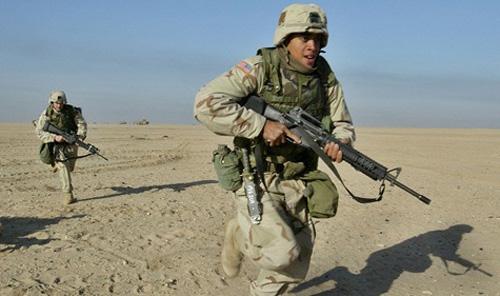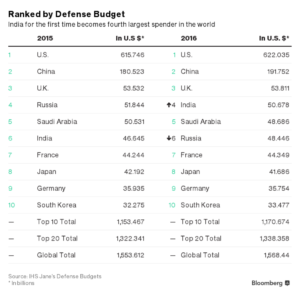Trump Isn’t Alone Planning Billions More on Military Spending

(Bloomberg) —It’s not just President-elect Donald Trump who’s bent on military build-up. From Europe all the way to China, the next decade will be marked by an increase in global defense spending amid rising feuds and pockets of instability, according to IHS Jane’s latest annual Defense Budgets report.
Global defense expenditures rose to $1.57 trillion this year from $1.55 trillion in 2015 as Asian nations act on growing nervousness around the South China Sea, said Craig Caffrey, principal analyst at the London-based defense and security analysis firm. Fenella McGerty, another analyst at IHS Jane’s, expects spending levels to return to pre-2008-2009 financial crisis levels by 2018. Here is a breakdown by regions.
Asia
China’s defense budget will nearly double from $123 billion in 2010 to $233 billion in 2020, according to the report, which forecasts defense expenditure for 105 countries. That is four times what the U.K. spends and more than the combined expenditure of Western Europe.India has overtaken Saudi Arabia and Russia to become the fourth-largest spender in the world. If the pound continues to weaken, India will spend more on defense than the U.K. by 2018, according to IHS Jane’s.
Europe
European Union members boosted their combined budget to $219 billion in 2016, with Western Europe leading the charge, the report said. The only things holding back future increases are economic constraints in the south — take Greece, for example — and the question marks hanging over Brexit.
Russia cut its budget for the first time since the late 1990s to $48 billion this year. Despite a hit from the dramatic drop in oil prices, the Middle East as a whole is not expected to dramatically reduce expenditures considering regional instability, Caffrey added.
America
At $622 billion in 2016, the U.S. is still the world leader in defense spending, with its budget accounting for about 40 percent of the global total, according to the report.
The Pentagon’s “investment levels going forward were to decrease by 1.1 percent in real terms, but with the election of Trump, the expectation is that both investment and readiness will receive injections of much needed funds,” said Guy Eastman, a senior analyst.




No Comment